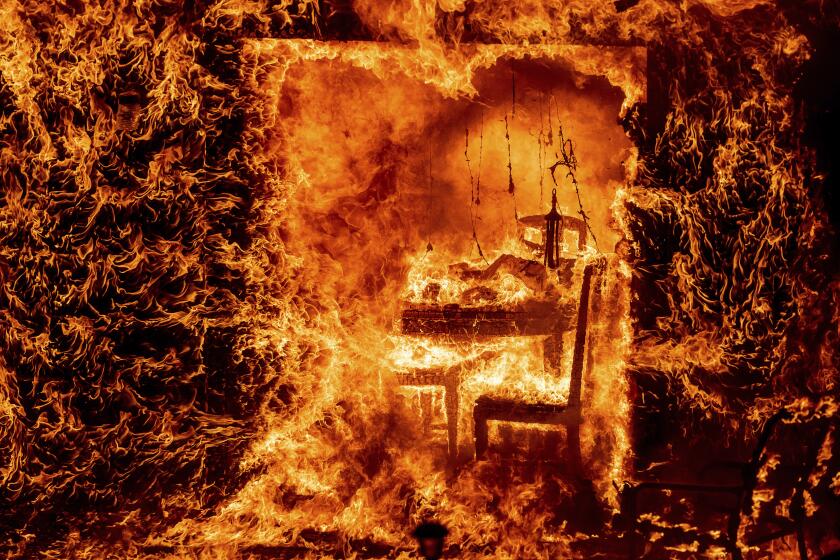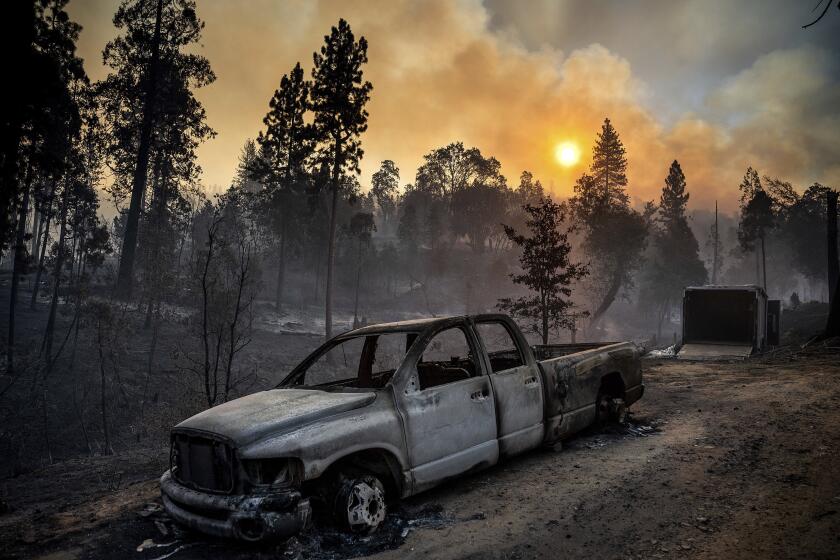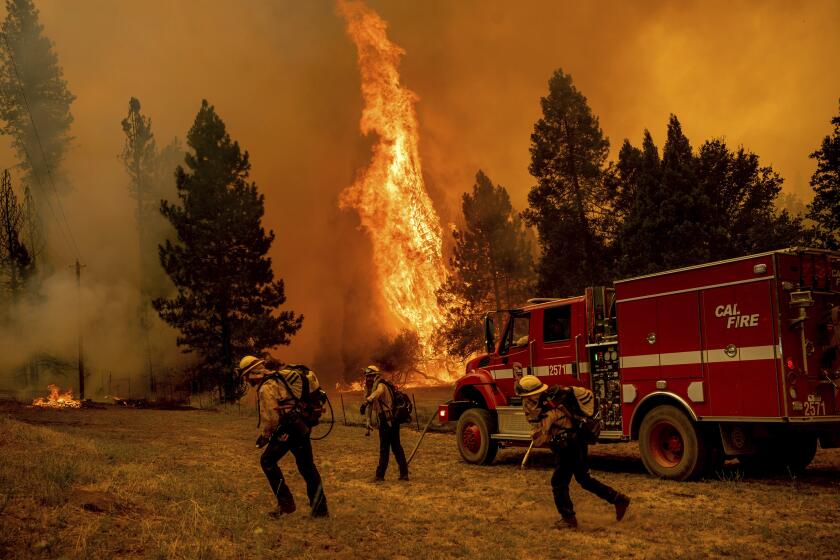Crews grow optimistic in battle against 17,000-acre Oak fire, which has destroyed 21 structures
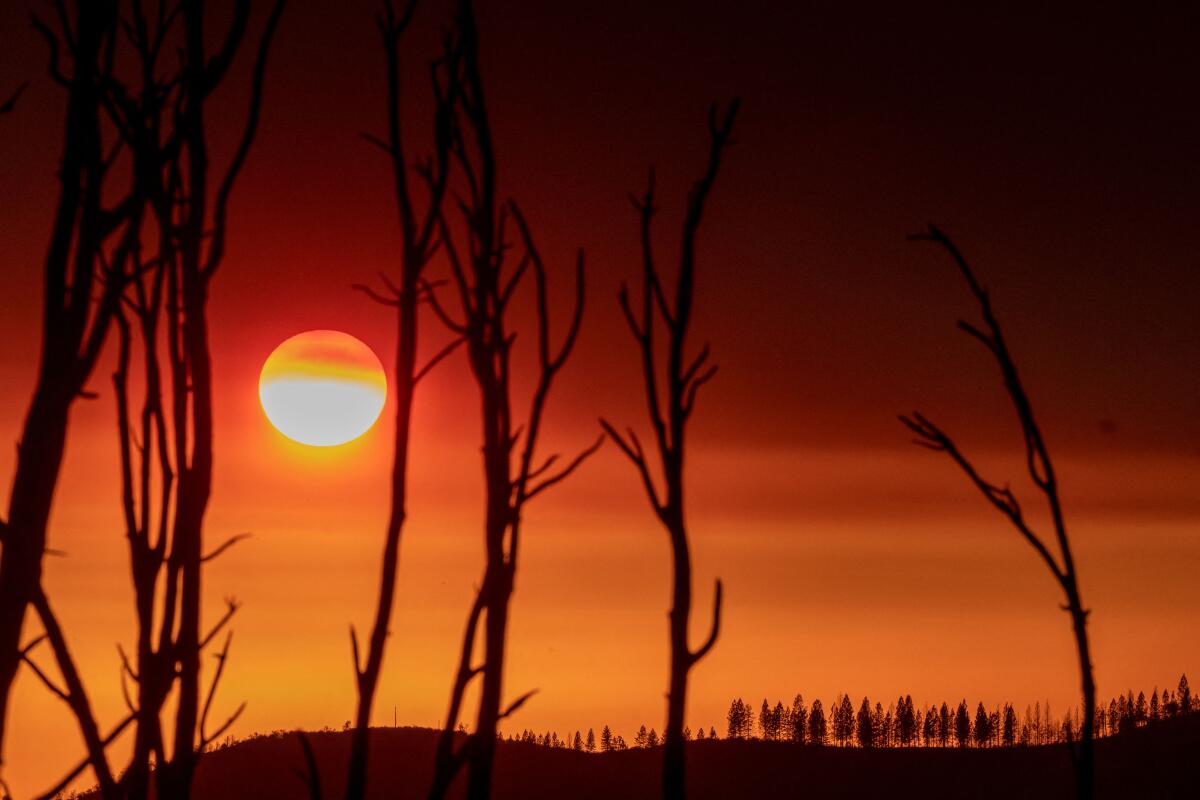
- Share via
Crews battling the Oak fire near Yosemite National Park may be turning a corner on the blaze as authorities noted minimal growth Monday.
The inferno in the Sierra Nevada foothills has forced thousands to flee their homes and destroyed at least 21 structures, but California Department of Forestry and Fire Protection officials were optimistic in an evening update, calling it “a successful day for aircraft and firefighters.”
The burn area, which grew exponentially Friday as the blaze exhibited extreme behavior on its first day amid hot, dry and windy conditions and an abundance of desiccated fuels, increased slightly Monday night to 17,241 acres — up from 16,791 that morning, Cal Fire said. Containment increased to 16% from 10%.
Assemblyman Jim Patterson (R-Fresno) visited with evacuees Monday and attended an evening briefing with state and federal firefighters.
“The fire is moving to the northeast, and that is away from the populated areas and away from the structured areas,” Patterson said, recalling information that was relayed at the briefing. “There is a real sense of the beginnings of an optimism.”
As the sun rose over the Sierra Nevada foothills, it appeared burnt orange through hazy skies in Mariposa County.
If the fire continues moving in that direction, the current wind conditions hold up and the containment plan works, the fire will burn into mountainous and forested areas, away from population centers or other structures, he said.
Those efforts have been buoyed by cooperation between Cal Fire and U.S. Forest Service firefighters, Patterson said.
“There is a unity here that’s starting to turn the tide,” he said. “The cooperation here has just been exemplary. That’s not always been the case.”
Nearly 3,000 personnel were assigned to the fire as of Monday night, along with 24 helicopters, 302 engines, 68 water tenders and other resources, according to Cal Fire.
The Oak fire started Friday near Midpines and quickly became California’s largest blaze of the season thus far. Gov. Gavin Newsom on Sunday declared a state of emergency for Mariposa County.
Officials have not determined what caused the fire.
Despite the early signs of progress, fire crews still have far to go before the containment effort is complete.
Humidity levels remained low overnight Sunday, which didn’t help firefighting, said Jonathan Pierce, public information officer with Cal Fire’s Incident Management Team 5. He said he did not expect any major shifts in weather.
“There are parts of the fire where behavior is dying down, but there are parts of the fire that are still active, more extreme,” Pierce said. Long-range spotting — firebrands or embers blown outside the main fire perimeter that can spark flames — continues to be a concern, he said.
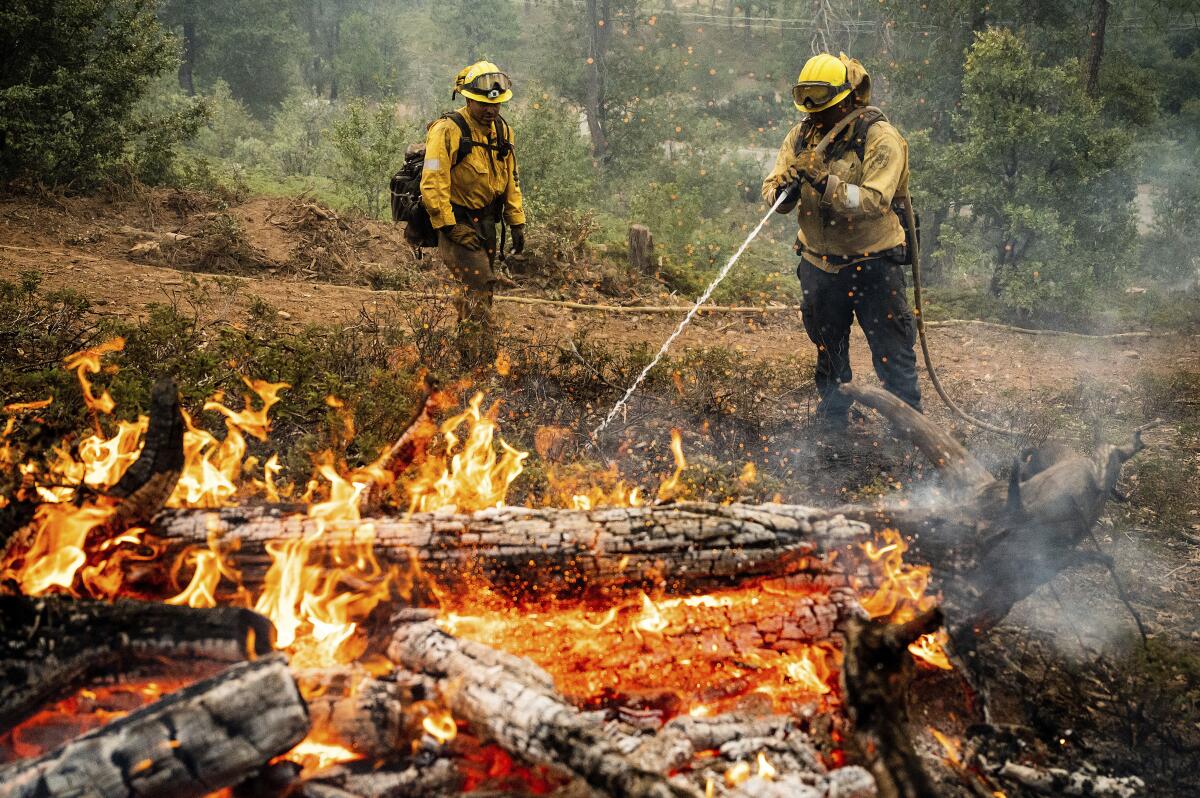
Evacuation orders were downgraded to warnings for some outlying areas west, south and east of the fire’s perimeter.
The Red Cross has opened a shelter at Mariposa Elementary School, where evacuees can also bring small animals. Large animals can be brought to the Mariposa County Fairgrounds, according to Cal Fire.
Red Cross spokesperson Taylor Poisall said about 40 people have slept at the shelter the last three nights, but many more have come in for resources such as free meals and showers.
Heading into the fourth night of mandatory evacuations Monday, Poisall said, the shelter is preparing for additional overnighters as the financial burden of an unplanned hotel stay can quickly escalate.
The Red Cross is prepared to shelter 100 people at the elementary school.
Patterson, who visited with evacuees Monday, said he was struck by the camaraderie and compassion he saw at the shelters.
“They were all looking out for each other,” he said. “It was something to behold.”
The assemblyman said he and his staff learned valuable lessons during and after the Creek fire in 2020 as they tried to assist residents with navigating the bureaucracy of state and federal disaster relief.
Though Patterson does not yet represent the area affected by the Oak fire, redistricting places those communities under his jurisdiction beginning next year.
Here’s what it’s like to live in the path of Oak fire near Yosemite, California’s biggest blaze of the year.
Nearly 2,500 structures remained threatened by the blaze, which is burning near the southwestern part of Yosemite National Park.
“It’s close,” said Scott Gediman, a park spokesperson. “If [the fire] gets into the park there, it will be technically in the park, but that’s not a main visitor use area.”
No park entrances or roads have been directly affected by the Oak fire, but Gediman said the closure of Highway 140 near the fire, between Highway 49 and Ponderosa Way, limits access to the El Portal Road entrance. Park officials recommend people driving into Yosemite from the south or west to use Highways 120 or 41 to enter the park, not Highway 140.
There have been no changes to hotel or campground reservations, but Gediman said air quality at the park continues to fluctuate, from both the nearby Oak fire and the Washburn fire, which is still burning in the park’s south region.
The Oak fire near Yosemite has grown to more than 15,000 acres, making it California’s largest blaze so far this season and prompting Gov. Gavin Newsom to declare a state of emergency for Mariposa County.
The Washburn fire, which ignited July 7 in Yosemite National Park, has burned almost 5,000 acres and is now 87% contained. It had threatened the park’s largest grove of ancient sequoias, but officials say the trees are expected to survive.
Gediman said the town of Wawona, which was evacuated during the peak of the fire, is set to reopen Thursday, and much of the wilderness area north of the town reopened Monday. The Mariposa Grove, home to the sequoias, remains closed.
Air quality in the Yosemite Valley and in many other areas of the park fell to “very unhealthy” levels Monday afternoon, according to the U.S. Air Quality Index. In such conditions, official do not recommend outdoor activities, which Gediman said has prompted park officials to halt some activities and rentals, such as biking.
Gediman said he’s hopeful that previous wildfires in and around southern Yosemite, including the 2018 Ferguson fire and 2017 Detwiler fire, have reduced the amount of ground fuel available to burn, which could help limit the momentum of the Oak fire.
“As these areas burn, they’re more resilient to fires — these previous fire scars help minimize the spread,” Gediman said. “The emphasis right now is both on fire containment and the structure protection.”
More to Read
Sign up for Essential California
The most important California stories and recommendations in your inbox every morning.
You may occasionally receive promotional content from the Los Angeles Times.
